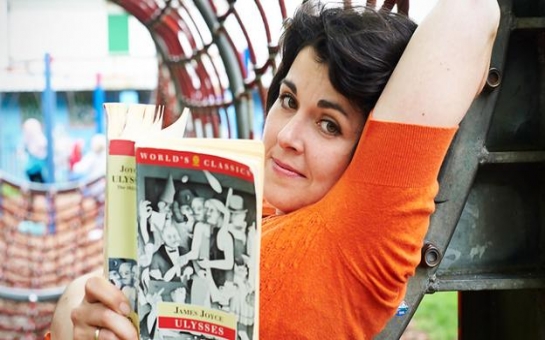When I was a plucky 16 year old, I took down a copy of James Joyce's Ulysses from the top shelf of my hometown’s only bookshop and carried its significant weight to the counter. I placed it in front of the bookseller, who looked at the book, looked up at me over her half-glasses, one eyebrow raised, and said, “Are you sure?” I replied that I was sure. Did I read Ulysses then? I did not. I don’t think I even tried. But still, after several house moves, in different countries and cities, I kept the book. So when I was challenged to read Ulysses in just one week, at least I owned a copy.Dear bookseller, twenty years later, I have now read Ulysses. Seven hundred and twenty three pages (in my edition, the Oxford World's Classics 1922 text) of very small text, very little punctuation and, at many times, very little sense. My goodness, is it difficult.At the most basic level, the book recounts one day: 16 June 1904, on which a young man named Stephen Dedalus and another man named Leopold Bloom go about their business in Dublin, and eventually meet. There is a funeral, a birth, a drunken episode and a shared mug of cocoa. Finally, the book offers a contribution from Molly Bloom, Leopold's wife. Not so complicated, right?However, Joyce expands on this basic structure in every conceivable way. I read not only the events as they happen but also every thought, half-thought and even sub-conscious thought as they occur to the characters. And wow, these thoughts! Every mundanity is examined and referenced to something else, usually something Classical. Both men are well-educated – they experience the world through their intellect. Thankfully, there are well-placed sections that are easier to read, 'breathers' that let you get back into the text.To read a book like this in a week means I must read about 115 pages a day – and I really can’t stress enough how tiny the text is. Because I have two small children, a part-time job and a sniff of a social life, this reading takes place while waiting for pasta to cook, during lunch breaks, waiting for a gym class to finish, outside in the garden at night with a torch, in the park and, my favourite place, holed up in my son’s bottom bunk bed with my head propped on his stuffed toy elephant – all a world away from the rarefied world of Bloom and Dedalus.Pause for thoughtAbout one-third of the way through the book, I stop to examine my own thoughts about my surroundings. I realise how little I really know about the world and everything I take for granted. (Who made this park bench? How are the people sharing this bench perceiving me?) This starts to make me feel strange, so I stop, and instead plunge back into reading about two men thinking in this way.The characters’ thoughts run on and on into other thoughts, endlessly. It is extremely bewildering, especially when new characters are introduced. On more than one occasion I find myself lost, wondering, “Who are all these other people? Where are they exactly?” At other times I become consumed with the practicalities of producing this book – pitying the poor copy typists faced with all the made up words, and wondering whether there's such a thing as a large print edition available and how you would cart that around. But still I read on. I have to admit that in one section, in which both characters are in a brothel and hallucinating, I fell asleep, having absolutely no idea what was going on. But still, on waking, I read on. This book was not going to beat me.On the home straightIn the penultimate section of the book (such sweet relief to be so close to the end!), Joyce writes about Bloom and Dedalus’ visit to Bloom's house in a style not unlike the instructions that accompany prescription medicines, with a series of questions before paragraphs of scientifically factual responses. This part of the book made me laugh – partly through relief at its clarity, but also because the writing here is genuinely funny. There's even some musical notation. I also feel relieved as Joyce seems to be letting me see the hidden structure behind most of the other sections. At last, a hand to guide me!This relief is short-lived, however, as I read the last section of the book, written from Molly Bloom's perspective. An eight sentence description of Molly's thoughts (42-and-a-half pages long, mind), rambling and filthy, I race through it, desperate to reach the end. And despite all of the confusion I have felt in the previous sections, I know for sure that I feel very sorry for Leopold and Molly Bloom.Ulysses is rightly regarded as a masterpiece. The intellect required to devise such characters, and also to convey their every thought, is phenomenal. Joyce presents characters so real, by using such a command of language, I can understand why Ireland is proud, and why there is a Bloomsday, and why readers want to celebrate Leopold Bloom. One day I will read it again, older and hopefully wiser... only next time, I'll give myself more than one week.(BBC)Bakudaily.az
‘I read James Joyce’s Ulysses in a week’
Culture
23:59 | 17.06.2014

‘I read James Joyce’s Ulysses in a week’
James Joyce’s long, difficult masterpiece has a fearsome reputation. To celebrate Bloomsday, Sarah Lynch took the challenge to read the whole thing in a week.
Follow us !










